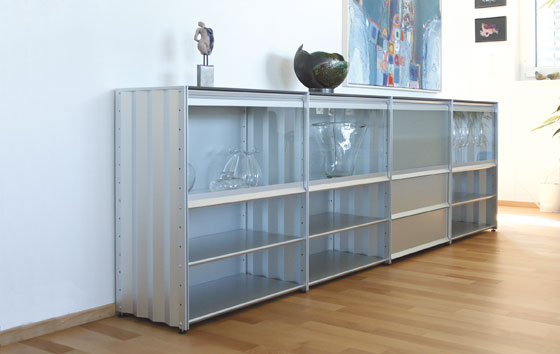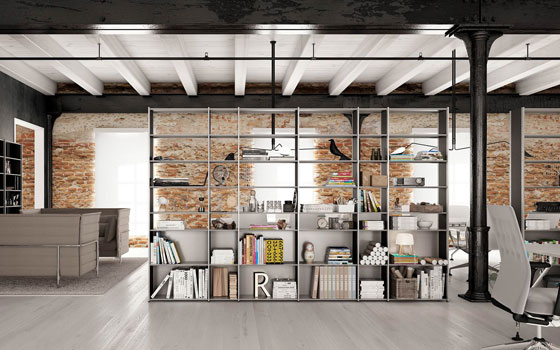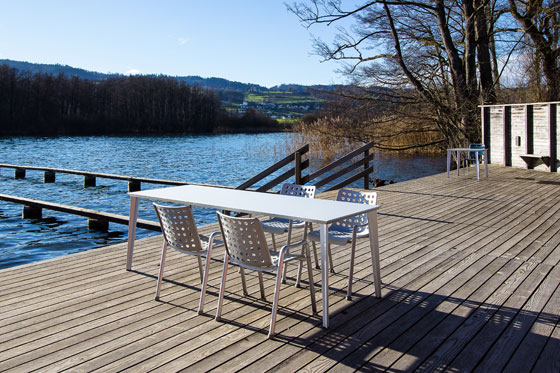Going Straight
Historia de la marca de Simon Keane-Cowell
Mellikon, Suiza
07.01.16
When a visionary, game-changing design needs a reboot to respond to the evolving needs of the market, consideration and perfect execution are called for. Here’s the story of how ADECO’s innovative RADAR shelving system made a striking comeback.
2016 marks the 20th anniversary of the launch of the game-changing, aluminium RADAR shelving system from Swiss manufacturer Adeco, with its minimal use of material for optimal architectural presence
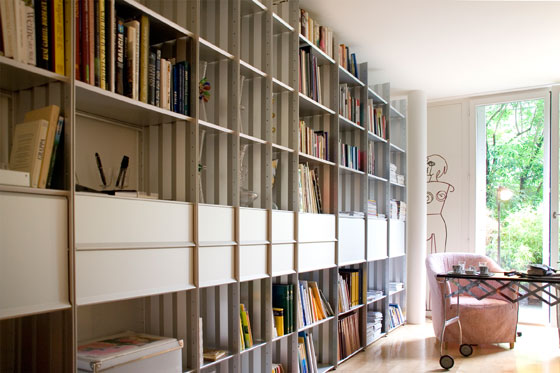
2016 marks the 20th anniversary of the launch of the game-changing, aluminium RADAR shelving system from Swiss manufacturer Adeco, with its minimal use of material for optimal architectural presence
×Sustainability, modularity, flexibility. If there were a republic of design, it could do a lot worse than having these three tenets as its founding principles. We’ve known for a long time that we can’t carry on producing and consuming as we have done for decades, indeed centuries. In the brave new world of environmentally and socially responsible living, making things well, using quality, ecologically sound materials, choosing the objects carefully that we want to be our companions, and then holding on them for as long as possible – all of this is key to affecting a cultural shift in our material existence.
If there were a product poster-boy for this new landscape, it could quite possibly be RADAR, the highly architectural, modular shelving system for both contract and residential spaces, produced by Swiss aluminium-furniture specialists Adeco. Completely new, however, this super-rational, super-clever, but visually modest programme, isn’t. 2016 sees the 20th anniversary of RADAR’s launch, the brainchild of architecture and designer Heinrich Gerhard. ‘Reducing to the max,’ as Adeco CEO Bernhard Scheuber puts it, is the essence of the design, which sees a filigree use of anodised aluminium played out across an impressively minimal set of dimensions – 2-millimetre-thick shelves, 1.5-millimetre drawers, and side panels measuring a mere 1mm in profile.
RADAR Classic's strikingly thin, 1mm aluminium side profiles provide super stability thanks to the fact they are folded – form follows function

RADAR Classic's strikingly thin, 1mm aluminium side profiles provide super stability thanks to the fact they are folded – form follows function
בDesign is as much about what you leave out as what you put in,’ explains Adeco’s head of sales Daniel Sturzenegger, who, involved with the project from the start and with a specialist background in design retail, worked with Gerhard on the successful marketing of RADAR. (Adeco went on to acquire the licence to manufacture RADAR – along with Sturzenegger – four years ago.) In short, the product was developed as an optimal balance between maximum stability and minimal material usage.
A millimetre of aluminum profile doesn’t naturally make you think of robustness, perhaps. But this is where the constructional cleverness of the design comes in. The folded, ziggurat form of the side panels transforms thinness into strength. ‘The idea wasn’t to launch a shelving system with folded side elements because there wasn’t one on the market already,’ explains Sturzenegger. ‘The brief was to develop a system based on a 1-millimetre-wide aluminium sheet.’ And that they did. Form truly followed function.
Adeco's RADAR Tripod table is lightweight, easily adjustable in terms of height and can be used outdoors thanks to its rust-free weather resistance
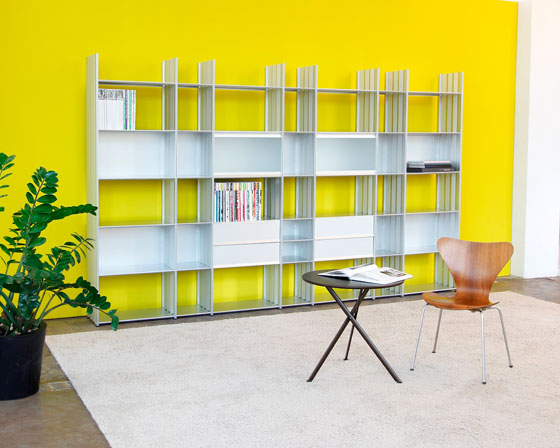
Adeco's RADAR Tripod table is lightweight, easily adjustable in terms of height and can be used outdoors thanks to its rust-free weather resistance
×And what’s a fold between friends? It’s just a formal change of direction at the end of the day. But what lent the award-winning RADAR shelving system its idiosyncrasy, its optical signature if you like, ended up dividing opinion. Something that isn’t always ideal when you’re also in the business of selling a product, not just seeking recognition for it. ‘As much as they were able to appreciate its technical construction,’ says Sturzenegger, ‘a certain section of the buying public’s instinctive reaction to the sides was “Are you also able to produce them straight, and not folded?”’ This, together with Gerhard’s untimely death in 2003, motivated Sturzenegger to seek out a new manufacturing partner, with whom he could develop further his vision for RADAR, which, by this stage also included the elegant and pared-down Tripod and Bistro tables.
The 10mm-wide SwissCDF side elements of the new RADAR 13 shelving system allow ultra-stable modular constructions up to 3m in height, with no glue used whatsoever
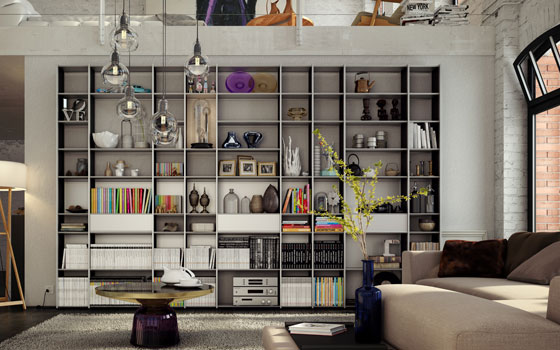
The 10mm-wide SwissCDF side elements of the new RADAR 13 shelving system allow ultra-stable modular constructions up to 3m in height, with no glue used whatsoever
×Adeco, with its track record in developing innovative products using fine and authentic materials and its emphasis on organisation and storage, was the perfect choice of collaborator, both on a strategic and a personal level. And CEO Bernhard Scheuber the perfect driving force. ‘We would meet up now and again,’ explains Sturzenegger. ‘We liked each other, we were on the same wavelength. And in German you say, ideas need many fathers.’ Or mothers, for that matter. Esther Scheuber, co-owner of Adeco: ‘It was a conscious desire to take a step further in the direction we’d already been going in. We already had a shelving system, but not a free-standing one. RADAR is really architectural. It can shape interior spaces, divide them. That was the challenge for us. To go in this direction. So it really was like hand in glove. We both shared a love of unspoilt, unadulterated, original materials. Nothing coated.’
As a free-standing, ultra-rational shelving system, RADAR 13 overs a highly utilitarian way of shaping interior-architectural space
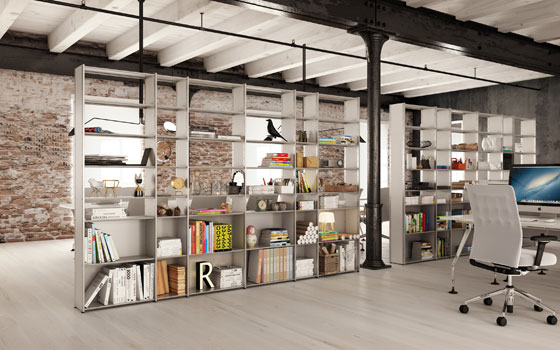
As a free-standing, ultra-rational shelving system, RADAR 13 overs a highly utilitarian way of shaping interior-architectural space
×With Sturzenegger on board, Adeco commissioned Zurich-based design office greutmann bolzern to work on a new iteration of the existing RADAR shelving, one which would address those aesthetically polarising side elements. The new system, called RADAR R13 (the old one was renamed RADAR Classic) would see aluminium replaced with high-quality SwissCDF, an innovative, compact-density fibreboard manufactured by Kronospan, which, while looking similar to MDF, possesses the robust technical characteristics of a material like high-pressure laminate. (The thinking is Swiss design, using Swiss materials, delivered by Swiss manufacturing... You get the picture.)
With any kind of glueing eschewed in favour of a classic harpoon connection, the R13’s SwissCDF sides measure 10 millimetres in width, allowing ultra-stable, modular constructions of up to 3 metres in height. ‘All you need are two good hands and an Allen key,’ explains Sturzenegger. ‘No third hand necessary. Building it is a bit like meditation.’ Aside from the new elements, the rest of RADAR design remains unchanged. This is still a system with pleasingly haptic, smooth-to-the-touch aluminium at its core, reflecting light modestly, never with glare. As Scheuber puts it, ‘When RADAR is empty, it’s almost like work of art. But it recedes when it’s full. It’s never dominant. Always elegant.’
Ground-level variations of up to 6cm are no problem for Adeco's super-reduced, super-precise aluminium RADAR T15 table
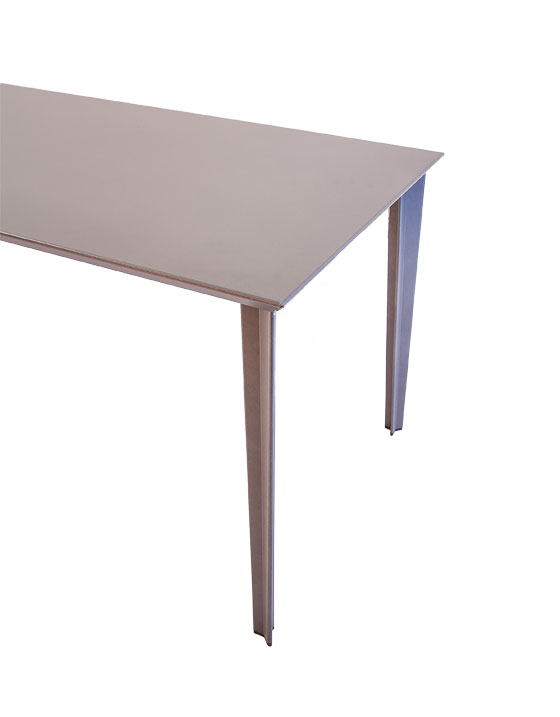
Ground-level variations of up to 6cm are no problem for Adeco's super-reduced, super-precise aluminium RADAR T15 table
×No glue is what you’d expect from a system that prides itself on its sustainability credentials. Aluminium, in addition to being lightweight and strong, is infinitely recyclable. Production of aluminium from recycled metal saves more than 90% of the energy required for its primary production, according to North America’s Aluminum Association. Eyebrow-raising stuff. ‘The wonderful thing about aluminium,’ explains Sturzenegger, ‘is that it can be recycled countless times and each time you’re left with 100% aluminium. There’s no degradation, as there is with glass, plastic or paper. You can recycle aluminium a thousand times and you’d still have 100% aluminium.’ And, just in case you’re wondering, SwissCDF is made from Swiss wood from sustainably managed forests, with 90% of the energy used during production coming from renewables.
When Hollywood remakes a classic, it’s often (let’s face it) a disappointment, and leaves you wondering ‘Why?’. What Adeco have achieved with their rebooted RADAR system is a significant development in aesthetic and engineering terms that retains the spirit and splendour of the original. A bit like the Goldberg Variations. The reinterpretation of a classic that’s immediately a classic in itself. Play on, RADAR, play on.


